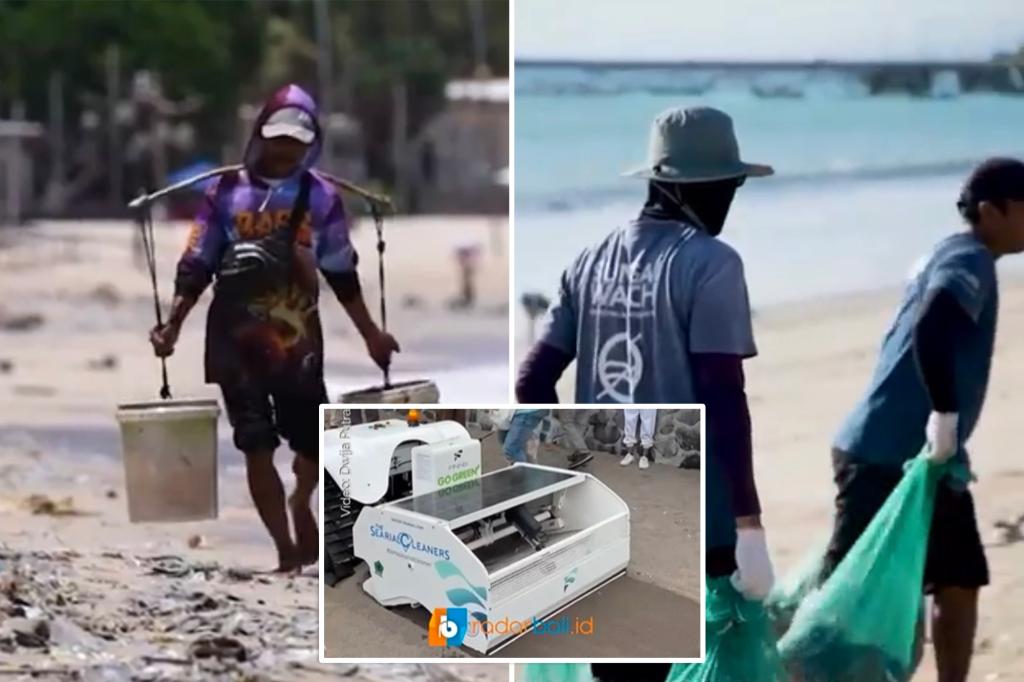Bali’s Battle Against Beach Waste: Innovation Meets Tradition
In the collective imagination, Bali epitomizes tropical paradise with its pristine white beaches, transparent waters, verdant rice terraces, and lush jungles. Yet for many visitors arriving at the island’s most famous shores, reality delivers a jarring contrast to these postcard-perfect expectations. Bali has been grappling with a persistent waste crisis for years, particularly evident during the October to March period when garbage routinely washes up along the tourist hotspots of Kuta, Seminyak, Legian, and Jimbaran. This annual phenomenon represents a complex environmental challenge, as plastic debris and waste from shipping vessels are carried inland by the seasonal combination of powerful winds, high tides, and driving rains. The problem extends beyond the beaches—Bali’s overflowing landfills strain local waste management infrastructure, leading to improper disposal practices where refuse ends up in waterways or unofficial dump sites that encroach upon the island’s natural beauty. While various solutions have been implemented with mixed results, a new technological approach has been quietly undergoing testing over the past two years, offering a glimmer of hope for this paradise under pressure.
Enter the BeBot Smart Beach Cleaning Robot, a high-tech solution being championed by both private enterprises and local officials. Recently, Alit Sucipta, the Deputy Regent of Badung, formally launched the deployment of this innovative beach-cleaning robot at FINNS Beach Club in Canggu. With a substantial price tag of approximately $65,000 USD, the BeBot has already been operating at the beach club for three months. The launch event brought together local leaders to discuss the future of beach management across Bali’s busiest tourist areas. Deputy Regent Sucipta expressed enthusiasm about the technology’s potential, suggesting it could serve as a reference point for broader implementation. “This robot can be used, but with an even larger capacity, so we can provide it to each traditional village in coastal areas,” he told reporters. While acknowledging that the current model has limitations, he envisions future iterations with enhanced capabilities that could collect diverse types of waste beyond what the present version can manage. This practical optimism reflects a growing recognition among Balinese officials that technological innovation must play a key role in addressing the island’s environmental challenges.
The solar-powered BeBot has already demonstrated promising results during its initial deployment. Operating for approximately two and a half hours daily, the robot has successfully cleared 180-meter stretches of both Berawa Beach and Perancak Beach. The impact has been quantifiable and significant according to Wayan Asrama, Director of PT Pantai Semara Nusantara (FINNS Beach Club), who noted, “Since this step began, we have succeeded in reducing the waste disposed of in landfills from 80 percent to 20 percent based on last year’s audit.” This remarkable achievement speaks to the effectiveness of combining technological solutions with committed management practices. Even more ambitious goals lie ahead, as Asrama added, “By the end of 2025, our target is for only 5 percent of waste to be entering landfill.” This progressive approach demonstrates how private businesses in Bali’s tourism sector are increasingly taking responsibility for environmental stewardship, recognizing that the island’s natural beauty is not only intrinsically valuable but also essential to their long-term commercial success. Deputy Regent Sucipta has expressed hope that other businesses will follow suit, investing in similar technologies to combat the island’s persistent waste challenges.
The introduction of beach-cleaning robots comes at a pivotal moment in Bali’s environmental history, coinciding with the official closure of Suwung TPA, the island’s largest open landfill. This closure marks a significant transition in waste management policy and underscores the urgency of finding sustainable alternatives. In this evolving landscape, environmental non-governmental organizations are playing crucial roles alongside technological innovation and government policy changes. Organizations like Mudfish No Plastic and Sungai Watch have been actively addressing illegal landfills and beach plastic pollution while simultaneously developing new systems for recycling and repurposing inorganic waste. Their grassroots efforts complement the high-tech approaches being deployed at tourist hotspots, creating a multi-faceted response to the island’s waste crisis that combines traditional community engagement with cutting-edge technology.
Sungai Watch, led in part by French filmmaker Gary Bencheghib who resides in Indonesia, exemplifies the dedication and impact of these environmental initiatives. The organization’s mission to protect Indonesia’s waterways has yielded impressive results: in 2024 alone, they collected over one million kilograms of waste (1,053,270kg to be precise), organized 503 clean-up events, and installed 104 trash barriers in waterways. These efforts build upon their already substantial track record, bringing their cumulative impact since 2020 to nearly 2.8 million kilograms of waste collected, 1,628 clean-ups organized, and 330 barriers installed. Such numbers translate to tangible improvements in water quality and habitat preservation throughout Bali’s river systems, which ultimately connect to the coastal areas where tourism thrives. The synergy between these community-based conservation efforts and technological solutions like the BeBot robot represents a holistic approach to environmental management that addresses both immediate symptoms and underlying causes of Bali’s waste challenges.
As Bali continues to navigate the complex balance between tourism development and environmental preservation, the convergence of traditional wisdom and modern technology offers a promising path forward. The BeBot robot cleaning beaches in Canggu represents more than just a novel approach to waste collection—it symbolizes a broader shift in how the island addresses its environmental challenges. By embracing innovation while respecting traditional village structures, as suggested by Deputy Regent Sucipta’s vision of providing robots to coastal traditional villages, Bali is crafting a uniquely blended response to its waste crisis. Meanwhile, the dedicated work of organizations like Sungai Watch demonstrates the power of passionate individuals to create meaningful change through persistent effort and community mobilization. Together, these technological and human-centered approaches are gradually transforming Bali’s relationship with waste, working to restore and maintain the natural beauty that has made the island a beloved destination for travelers worldwide. While the challenge remains substantial, these integrated efforts provide reason for cautious optimism that Bali can reconcile its status as a premier tourist destination with responsible environmental stewardship for generations to come.













